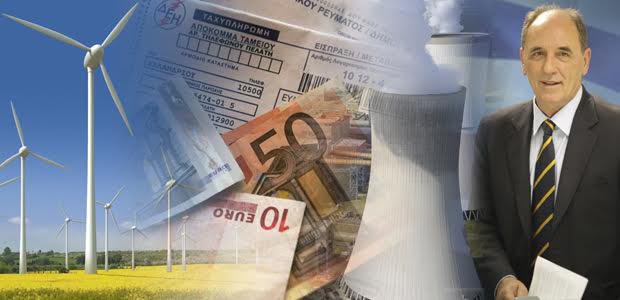An agreement reached between the government and the country’s lenders on the Greek bailout’s second review, announced yesterday, includes a section requiring settlement of outstanding public service compensation (YKO) payments by 2022.
This essentially means that the energy ministry will need to figure out a way to deliver pending YKO payments owed to the main power utility PPC without increasing electricity bill charges for consumers, a development that would further weaken the coalition, well behind in polls.
Highlighting the dilemma faced by energy minister Giorgos Stathakis, an initial announcement released by the ministry yesterday promised that the outstanding YKO payments would be settled over a five-year period so as to avoid considerable electricity bill increases before a revised follow-up statement was released noting the issue would be sorted out over five years without any electricity bill increases.
Public compensation surcharge amounts, raised through electricity bills, are primarily used to subsidize higher-cost electricity generation on the non-interconnected islands. PPC is the main recipient of YKO amounts as it operates high-cost mazut and fuel-powered power stations on the non-interconnected islands. Since 2012, full YKO-related amounts had not been fully paid out to avoid electricity bill increases. An amount owed to PPC has accumulated.
PPC claims this amount has reached 735 million euros. RAE, the Regulatory Authority for Energy, is currently making an effort to see where the figure stands. Initial estimates by the authority indicate the figure is considerably less – around 400 million to 500 million euros.
YKO-related books have not been adequately kept, creating confusion. IPTO, the power grid operator, theoretically responsible, and another operator, HEDNO, will need to provide updated figures to RAE over the next few days. Full clarity on the issue will need to be established by the end of the month.
Authorities will need to decide whether the required YKO amount will be fully provided by consumers or if the state can cover at least part of the amount, if not all.
RAE chief Nikos Boulaxis recently told Greek Parliament that state budget coverage of public compensation surcharge amounts is common practice in most EU states.
According to energypress sources, RAE intends to propose that the state cover at least part of the outstanding YKO amount. This could be achieved through the state’s transfer of special consumption tax (EFK) collected for island power unit fuels to the public compensation service account. This amount is estimated at between 100 million and 130 million euros, annually.





